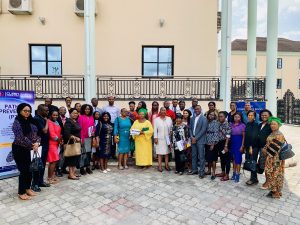
Background and Rationale:
Human trafficking, or modern-day slavery, involves the illegal trade of people via force, fraud or coercion for exploitation or commercial gain. It occurs in every country in the world, cutting across social class, gender and age. It violates human rights, while simultaneously presenting a global health concern. Over the last 20 years, there has been growing concern over the phenomenon of modern-day slavery and considerable media attention has been directed towards amplifying the issue to ensure that it receives the urgent attention it deserves. Similarly, source, destination and transit countries have also began to prioritize the issue by enacting the necessary legal and policy frameworks in an effort to decrease the scourge of trafficking that is occurring worldwide. On the part of source and transit countries such as Nigeria, however, the approaches to addressing human trafficking, particularly sex trafficking, have largely been limited to the development of laws and policies, often with impotent and ineffective law enforcement. Other efforts have focused on empowering the potential victim or the local community against trafficking. Significantly, little to no focus has been placed on the middle men/women, i.e., local recruiters (“Enablers”) who are the lifeline of the trafficking chain, as they link the potential victim to the trafficker. To this end, there is a wholesale shortage of reliable, measurable data based on qualitative and quantitative research that has been culturally translated to serve as a springboard from which effective and targeted interventions could be developed and/or framed.
Path to Prevention Project
In partnership with CLEEN Foundation (www.cleen.org) and with support from DFID/UK AID (as part of its ‘Stamping Out Slavery in Nigeria’- SoSiN- Project), the ‘Path to Prevention’ Project is a research project aimed at empowering and “slave-proofing” local communities in Edo State by deterring the recruitment of potential victims for sex trafficking by local recruiters (“Enablers”). Our hypothesis is that by targeting local recruiters, the link between potential victim and trafficker will be broken, thus reducing the incidence of sex trafficking in Edo.
Our project launched with a Methodology Workshop in Benin City on August 14th, at which time we gathered dozens of engaged stakeholders across all sectors, including survivors, to inform them of the Project and to provide their insight and experience into the role of recruiters in Edo State, the government and community response and our projected research tool. Stakeholders included NAPTIP Benin, DAI-MADE, the Edo State Task Force Against Human Trafficking, NACTAL Coalition, FIDA, various government agencies (Immigration, Ministry of Women’s Affairs, Ministry of Youth and Sports, etc.) as well as various CSOs and NGOs. Following the Workshop, on August 15th, the partners trained a dozen field workers for the Project, which will continue until Fall 2020.
For more information on the ‘Path to Prevention’ Project, please follow us on Twitter @pathfindersji #PathToPrevention or email info@pathfindersji.org.


Recent Comments